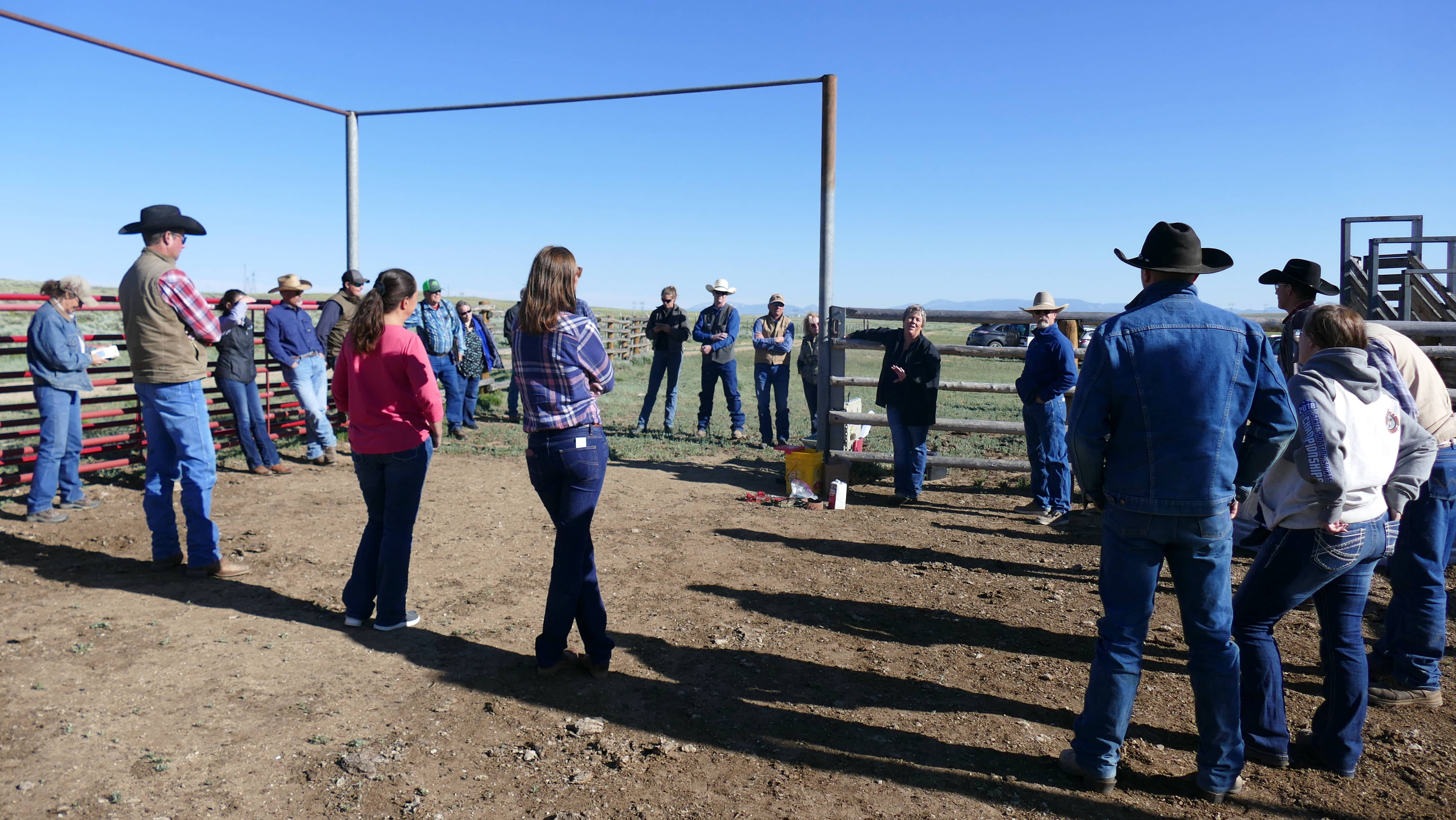
By Shannon Lukens.
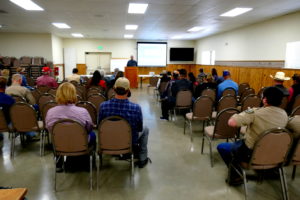
Livestock producers met in Jackson County Monday to talk about wolves. It was hosted by the North Park Stockgrowers Association and Western Landowners Alliance.
Colorado Parks and Wildlife was there with an update. Instead of a breeding pair of wolves with a litter of six, they have only seen the one gray male with five yearlings. That’s as of last week. None of the wolves are collared right now so they can’t track them. Or it might be that none of the collars are working, according to CPW District Wildlife Manager Josh Dilley. He says there are no plans right now to re-collar the wolves. If they did it, it would probably be in the winter because the wolves don’t do as well being collared in the summer. He said there is a lot of red tape to get through to get those collars.
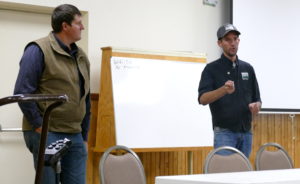
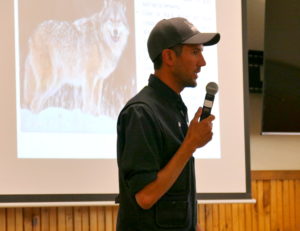
One speaker at the gathering was Ely White, who is a wildlife specialist with the US Department of Agriculture. He grew up in Craig.
Ely White had a few facts about wolves including that they prey on deer, elk, horses, moose, cattle, sheep, dogs, and small rodents. “They will take whatever they can.” Wolves are opportunistic and will feed on whatever prey is available. They also tend to stay near the den but he said the wolves can travel 10-20 miles a day.
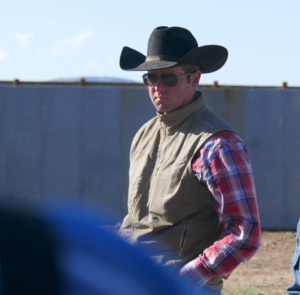
Mark Hackelman is a cow/calf producer at a ranch in Cowdrey, which is just north of Walden. He blames the problem on mismanagement.
CPW also announced that they have hired Adam Baca with Montana Wildlife Services to be a new Wolf Conflict Coordinator. He’ll be based somewhere on the Western Slope, probably in Jackson County. He starts June 27.
Western Landowners Alliance Story by Adam Baca
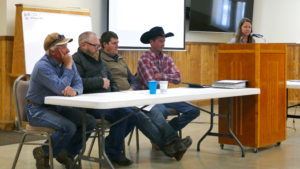
The event started with a Panel titled, “The Situation in North Park: Livestock Production, Resource Concerns, and Wolves.” Panelists were Mark Hackelman, Adam VanValkenburg, Mike Morgan, and Don Gittleson.
Comments from the panelists:
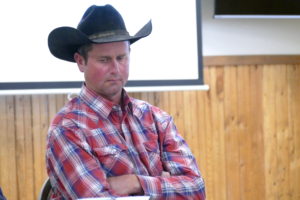
Mark Hackelman said he has had to feed excess elk because they wouldn’t leave. The wolves have disrupted the elk patterns. Hackelman says there is a complete lack of management for the wolves and it affects the overall health of the landscape. Unrestricted predators will have a negative impact on rangeland health. Hackelman addressed compensation, and that indirect losses should be tabulated. What does it cost to run a cow? The minimum payment should be at least the annual operating cost for that cow. Hackelman says he doesn’t hate wolves. The problem is the lack of management. They are fascinating creatures. You can’t protect the private properties from the wolves.
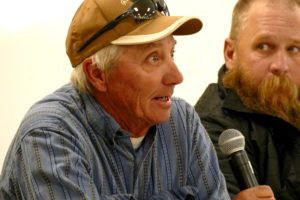
Don Gittleson said there has been a lot of fence repair because of the wolves. Calving has had to be closer. Talking to the press has been a lot of his time. People were being paid to watch for wolves on his property at night. Many times they wouldn’t show up. Many times the wolves showed up and the people watching for them missed it. Finally, Don did it himself until he couldn’t do it anymore. “I decided that I can’t continue that way at night so the cows will have to be on their own.” Don also said he needs the non-lethal things to work. Wolves have to be afraid that people will either harm them or kill them. There needs to be hunting when there are enough wolves. The wildlife officers also need the ability to do that. People that we elect into office need to be aware, also of depredation compensation. Don said you can’t use stock dogs when wolves start to come around. He says Colorado is the model state for how NOT to manage wolves. He said Colorado Parks and Wildlife officers are in the worst situation. There are things they should be doing but they are not allowed to do. “Give them a little bit of a break.” Gittleson said the volunteers to watch his herd at night turned out but then it was not as easy as they thought. They started to not show up even though they were getting paid. He thinks they just wanted to see a wolf. Gittleson said the disposition of cows changes when wolves come through. He said you can’t replace those cows for what you paid. You can’t get a cow back into production fast enough to replace it. “We don’t want our cows to die.” Gittleson said “You’ll lose a lot of sleep. You’ll dream about wolves a lot.” He said there are a lot of issues that you won’t get compensated for.
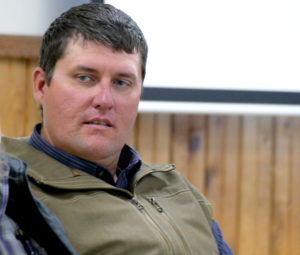
Adam VanValkenburg said the fladry took a long time to put it. He said there were 14 people to do three miles of fladry around the pen and it took all day. He also says hazing procedures in the summer, such as firecrackers, can be a fire danger. He would like some tools for night watching and nighttime wolf hazing procedures. Consider the overall impact of the herd. Don’s cows have had more mastitis. These are hidden figures that affect depredation. Wolves have a worm that can infect the animals on the ranch. VanValkenburg said to get involved with people. Talk to them about the wolves.
Mike Morgan said the key is “education.” People have to be educated as to the ranchers’ way of life, and their livelihood. Decisions made in populated areas affect those in the rural areas. “They don’t have a clue. We need to get our way of life out to the people because they don’t understand our livelihood, the emotional impact, and the financial impact,” caused by the wolves. There will be a learning curve because Colorado Parks and Wildlife has not had to deal with these problems in the past. He also says we need to educate our kids and the next generation so their learning curve isn’t as huge. Kids need to attend meetings like this too. He says to talk to people and do it calmly and be very factual. “The wolf is the most emotional thing out there right now.” Morgan also thinks the money will run out for compensation. “What will happen when there are multiple packs around the state? The money won’t be there. It will run out.” Morgan said compensation should take genetics into effect. There are too many holes in the compensation plan. He said, “The wolf issue is mismanaged when it is wildlife management through legislation.”
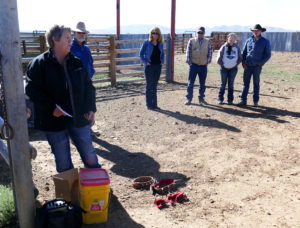
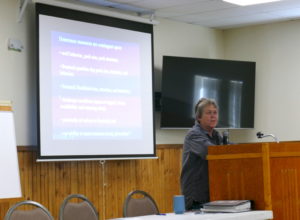
Cat Urbigkit is a Livestock Producer and Author from Pinedale, Wyoming. She also runs The Shepherd – A Guide for Sheep and Farm Life. Urbigkit was the keynote speaker on Deterring Depredation. She also spoke about Wolf Monitoring out at the Hackelman Ranch. She said deterrence includes guardian animals, physical barriers and deterrents like scarecrows, bells, and flashes, and trucks and stock trailers parked on the property. She said husbandry practices including moving sick animals and removing wild animal carcasses from near your herd.
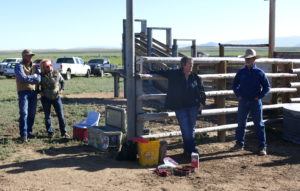
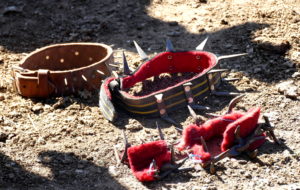
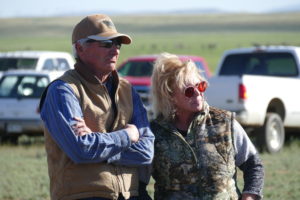
Human interference includes noisemakers and guns. Grazing practices include pasture rotation. Urbigkit said livestock guard dogs are best when they wear spiked collars. She said it is, “Critically important to get lethal control in Colorado. Wolves are lethal. It is never if, but when. The livestock industry diminishes wherever wolves occur.” She says the impact of wolves is not shared equally.
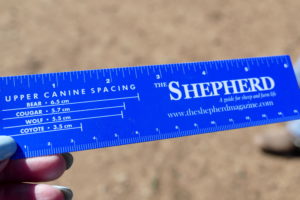
Urbigkit passed out Upper Canine Spacing measuring tools. It is used when you are trying to figure out what predator killed your animal.
She added the Four Cs for Conflict Reduction from Western Landowners Alliance.
- Conflict Prevention — Non-lethal methods
- Control — Lethal removal
- Compensation — For losses, plus financial incentives
- Collaboration — meaningful, local-level
The Shepherd – A Guide for Sheep and Farm Life
P.O. Box 168, Farson, WY 82932
TheShepherdmagazine@me.com; 307-389-3385